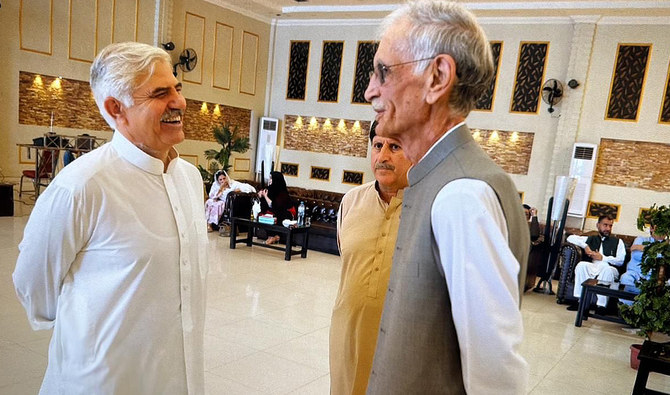PESHAWAR: Political analysts on Tuesday had a lukewarm response to the formation of a new party of estranged associates of former Prime Minister Imran Khan, with some saying it could pose a “daunting challenge” to the ex-premier’s vote bank in the northwestern Khyber Pakhtunkhwa (KP) province, while others said it would only act as a ‘disruptive’ force in a few select constituencies.
The Pakistan Tehreek-e-Insaf Parliamentarians (PTI-P) was announced on Monday and is headed by former defense minister Pervez Khattak, until recently a close Khan aide. In June, sugar baron Jahangir Khan Tareen, who was for over a decade Khan’s closest confidant but fell out with him in 2020, also announced his own party, leading to widespread speculation that a king’s party was being primed as a viable alternative to Khan, whose Pakistan Tehreek-e-Insaf (PTI) is arguably the most popular political party in the country. King’s party is a common euphemism in Pakistan used for one favored by Pakistan’s powerful military.
In a press statement, the newly formed Pakistan Tehreek-e-Insaf Parliamentarians (PTI-P) said over 57 lawmakers that were part of the previous KP assembly under Khan’s rule had joined the PTI-P. Former KP chief minister Mahmood Khan is among them. Khan’s PTI was in power in KP from 2018 to 2023 and the province is considered its political heartland.
“Pervez Khattak and Mahmood Khan, former chief minister and defense minister respectively, have their political clout in the province. The new development will for sure create problems for the PTI to diminish its vote bank and polarize its vote,” Shamim Shahid, a Peshawar-based political analyst, told Arab News.
While Khan still enjoyed popularity in the province, especially among the youth, Shamim said the former premier may find it difficult to field candidates against the Khattak-led group when polls were held.
“Those who joined Khattak’s party had widespread popularity and served the masses, [it] would be a daunting challenge for anyone to defeat them,” he added.
Senior journalist and analysts Hassan Khan said Khan aides had been in disarray since parting ways with the opposition leader following violent May 9 protests in which military installations were attacked by his supporters, prompting a government-led crackdown against Khan associates and supporters. Unwelcome in the Jamiat Ulema-e-Islam-Fazl (JUI-F) or the Awami National Party (ANP) in KP or the ruling Pakistan Muslim League-Nawaz (PML-N), they needed a new home, Hassan said.
“Now in the shape of the PTI-P, those alienated PTI politicians have found a refuge,” Hassan told Arab News. “The new party has importance in a sense that it has two former chief ministers, former MNAs (Member of National Assembly) and MPAs (Member of Provincial Assemblies), which can offer stout resistance to the PTI.”
A contest between the PTI and PTI-P could also benefit a third political entity when general elections were held later this year, the analyst said. Also, while it seemed unlikely that the PTI-P would secure mass support throughout KP, it could be a “disruptive force” for Khan in a few constituencies from where heavy-weight PTI-P candidates ran.
Analysts also said without the military’s support, and in fact amid an all-out conflict with it, it would be difficult for Khan to do well in the next general elections.
Thousands of Khan’s supporters took to streets after his arrest in a land graft case on May 9, burning and attacking police, government buildings, official and public vehicles, military assets and installations. The government and military have since said they would try the rioters and their instigators in military courts. Khan says the campaign is aimed at putting him in jail and dismantling his PTI, which the government and military deny.
Pakistan has been ruled by the military for about half its history and tensions between governments and the top generals often dominates politics.
But Shahid, the Peshawar-based analyst, said this time, the military’s interference in politics and its confrontation with Khan had also exposed it to unprecedented public anger.
“The military establishment should now keep itself at an arm’s length from politics,” he said. “Otherwise, any results of the incoming elections will be dangerous.”



















